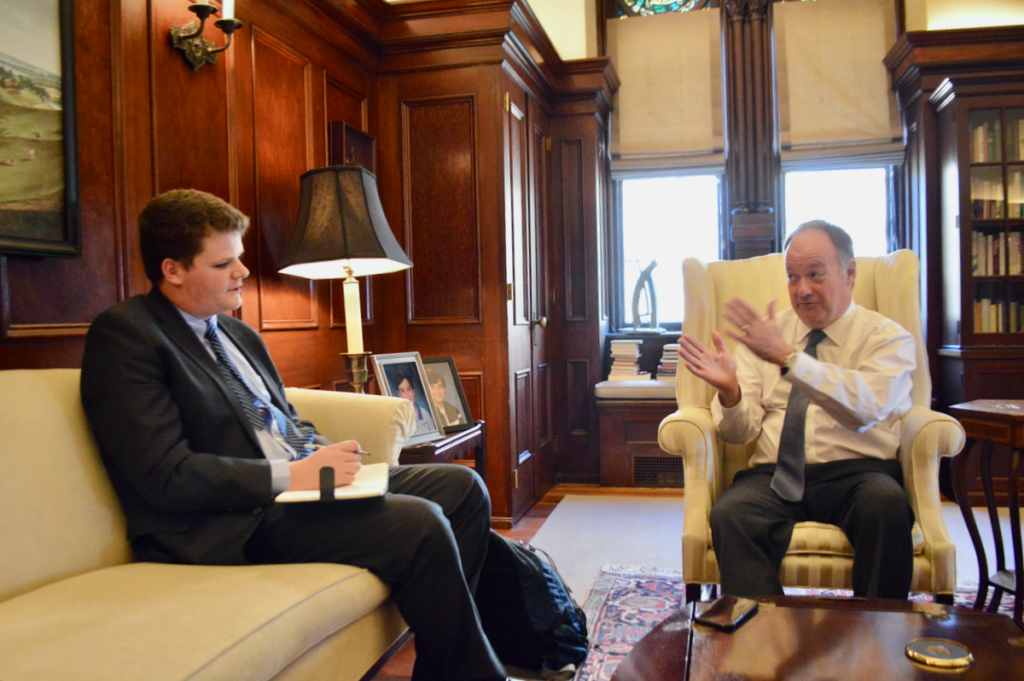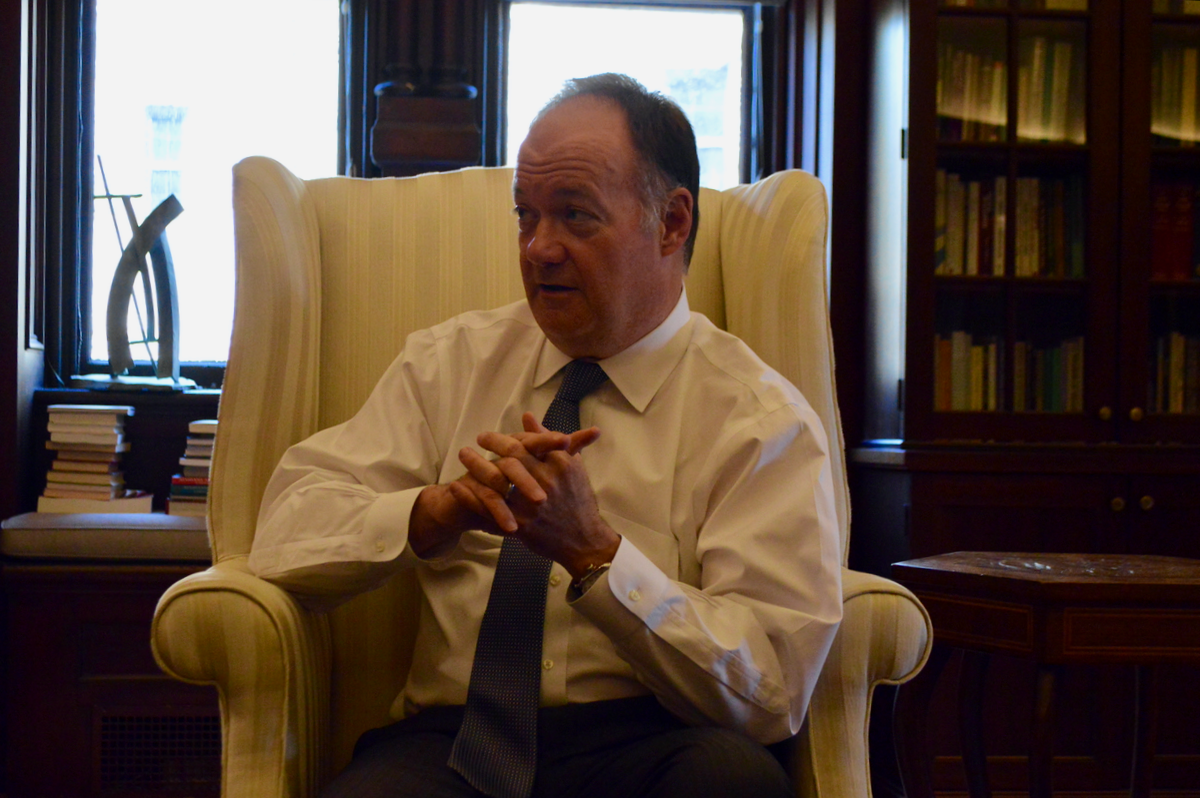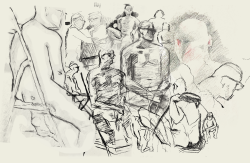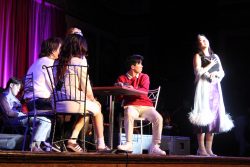On April 11, former Editor-in-Chief Graham Piro sat down with President DeGioia to discuss the issues of free speech, affordability, Nike, Georgetown’s relationship with its legacy of slavery, and the basketball program. This interview has been edited for clarity and length.
Student Life
Graham Piro: Right now, what do you think the biggest challenge is facing Georgetown students?
President DeGioia: There’s been no moment quite like this one in America. If I just speak a little bit about the fundamentals of the world that you’ll be entering, so right now, if you don’t have a post-secondary degree in America, you don’t really have much of an opportunity to participate in the economy in a very meaningful way. Two thirds of all new jobs require post-secondary education, but right now only a little over 40 percent of Americans will have post-secondary. So one of the dynamics that has characterized our economy for almost three decades, well more than three decades now, is that our economy produces far more jobs than higher education produces people for those jobs. Two thirds of all new jobs require post-secondary, we’ll underperform the economy in the next decade by 11 million jobs. Since the recession, 11.6 million jobs were created, 80,000 went to high school graduates. 80,000. So you’ll be entering a workforce where virtually there’s no unemployment, you’ll change jobs probably five times in that first decade, and you will not achieve financial independence until age 31. These are anomalies.
Universal employment, financial independence at 31, it’s a volatile economy. It’s not like you’re going to be checking back into your parents’ house and moving back in but you may need some help, ‘cause you’re not going to be independent, on average, until age 31. When I was growing up it was probably 27 so it’s gotten progressively older. It’s the same in the UK, it just takes more for you to ultimately get settled, and to a track that enables you to settle down. So it’s a volatile economy and what I think the most significant challenge that our students will face is how do they enter this economy, manage that volatility, ensure that some values that animate them, that really provide meaning in their lives can be realized in the context of managing this complex context in which we’re all needing to find our way. What do I mean by the values that animate them? We have deep, deep engagement in social justice work, in campus ministry work, artistic and creative engagement. How do you sustain those dimensions of yourself that really mean something to you, like taking pictures, I mean, if photography is your passion? And yet you’ve got to figure out how to navigate your way, this is a very challenging period for young people. How do we ensure that we can be whole, be what we’re capable of, fulfill our promise and our potential, while managing this very challenging environment? So, part of what you need to be doing is beginning to prepare for the complexity and the volatility and the uncertainty of this current context.
Affordability
DeGioia (cont.): For the university, our biggest challenge is to ensure that this place is accessible and affordable, and the means by which we have done that since 1978 is a need-blind, full-need financial aid policy. Need-blind admissions meet full-need financial aid. We are only one of 25 schools that are still capable of being need-blind and full-need, but basically what that means is that we don’t believe your ability to pay is a relevant factor in our decision to admit you. We look at many other things, we don’t think that’s relevant. And then once you’re admitted, we’re committed to helping you cover the full cost. We do so with borrowing, that is on average, below what would be national, and our packaging of debt for those roughly let’s say roughly half of our student body will need to borrow, roughly half, the amount that we’re asking is well within the kind of framework that you would be, you would be earning. So, but how do we do it? We raise more money in philanthropy in the last roughly six years then we did in the previous 220 years of the institution. It’s been a very generous community of alumni and friends and family that have been able to help us sustain this effort, and that will continue, you know we’ll need to have to work and work and work at keeping this place accessible and affordable.
Piro: On the point of affordability, tuition has been increasing fairly steadily over the past few years.
DeGioia: At far lower rates than historically.
Piro: At what point do we say, “This is the point where we have to cut off,” or is there a point where you think we can no longer raise tuition?
DeGioia: Well it’s a great question, every year our expenses increase. Why do they increase? Utilities go up, faculty salaries increase, the cost of goods and services that we need to purchase to deliver the program here goes up, so our expense base goes up. So, how do we cover our expense base going up? One way has been to look at the different forms of the revenue that we have access to. One of those forms has been tuition. We’ve had far slower growth in tuition in this last decade than we would’ve for the previous 40 years. We had very small levels of growth in the period right after the recession, for the next few years after the recession. We are now roughly in a place commensurate with our peer group. And we’re keeping it as low as we can. Because when we raise it, it also increases our costs and financial aid, for the 45 percent who need access to need-based aid, if we raise it a dollar, we have to find a dollar for all of those 45 percent. We have incentives to keep it low. But the challenge is always, I mean, I read your paper. Every issue, there’s a wonderful idea in your paper about how we can make this place better. It always costs money. So the question is, how do we meet that? We’ve been very blessed in that our families and alumni have been incredibly generous. We’ve raised more money in the last 15 years, we’ve raised two times in the past 15 years what we raised in the previous 200 years. We’re very luck that we have a very generous community capable of supporting and that’s contributed so the percentage of our operations that are covered by tuition is lower today than it’s been. It’s been offset by other sources including philanthropy.
Free Speech
Piro: One thing that’s recently been announced has been a 39.5 percent budget decrease in Media Board. What do you think is the future of student media on campus and what do you think the relationship between the administration and student media is?
DeGioia: I think the future of student media is incredibly bright, and it’s exciting. I think, I can’t say that I am an expert in the deliberations of the Media Board and why they made that choice, but if I were reading between the lines or just picking up some of the cues of some of the language that I read, I would say that they’re imagining that there will be far less cost for print, and so you’ll be much more digital as you go forward. I don’t know truly how to make sense of their decisions. I believe the process, which is clearly articulated and student-run. It’s a student-driven process. It’s a very healthy one, but I imagine they’re probably making some assumptions regarding the future of print itself, not the future of media, but the future of distribution.
Piro: Going off the student media theme, I want to talk about free speech in general on Georgetown’s campus, and the first question is what do you think Georgetown’s role in the place of higher education is? Is it presenting a community for free and open discourse or is it protecting students who feel endangered from certain discourse?
DeGioia: So our policies on speech and expression were crafted in the late-1980’s. They’ve guided the community; they’ve gone through revisions over the years. We do not limit speech, either on the content of the view or the person expressing the view. It’s subject to reasonable time, place, and manner restrictions, which is the spirit of the First Amendment. This has guided us for nearly 30 years, and we’ve had a speech and expression oversight committee that has helped monitor this over the course of these 30 years. We do not limit speech, either on the content of the view or the person expressing the view. Now that being said, we recognize that some forms of speech, some speakers, and some forms of expression can be very hurtful to members of the community, and we try to respect that, try to understand it, and try to determine what’s the most appropriate way for an institution to respond. I’ll give you an example. A year ago about now, there was a rather significant concern over the invitation to our campus of the president of Planned Parenthood. I made it very clear very early on we do not limit speech either on the content of the view or the person expressing the view, and we will protect that speech, but I was severely criticized for protecting the forum at that time. How did we respond in that moment? Well we organized three other events in which alternatives to the perspective would be presented. I spoke at one of them. I introduced a panel that focused on the moral issues at stake. And we tried to be very attentive to the concerns of those who felt offended and harmed by the presence of that speaker, so far as to meet with the student leaders of groups that were among those who were disturbed by the event. Great care and great attention can be given in any one of those sets of circumstances and we don’t limit speech.
Piro: On the flip side of Cecile Richards, looking at the incident that happened at Middlebury recently, do you ever think there would be a place for a speaker as controversial as Charles Murray on the campus?
DeGioia: We’ve had very controversial speakers here over the years. A review of the archives of the Georgetown Voice will show you some of the controversial speakers we’ve had. But our position has been the best answer to that speech is more speech. And we will protect the forum. We also recognize that our responsibility doesn’t stop with protecting the forum. It only begins there. And from there we have a responsibility to engage with our community in ways that will ensure that the concerns of those who might be offended by a particular speech or speaker are understood.
Piro: So do you think that student groups that are unrecognized like H*yas for Choice, do you think that they have enough access to the ability to make their voice heard?
DeGioia: Yes.


Nike
Piro: What’s the current state of the Nike contract?
DeGioia: It was allowed to expire on Dec. 31.
Piro: And how have those negotiations been since?
DeGioia: I think you may be aware, I think you guys have covered this, we made it very clear to Nike that we will only recommit to the licensing agreement once we resolve two fundamental questions regarding our oversight group: the access of the Worker Rights Consortium and then Nike’s compliance with our agreement. That being said we also recognize that given our place, our history, and our tradition, and our longstanding relationship with Nike, we might be able to play a role in a larger national discourse regarding the issues at state. We brought in one of the great group facilitators, Don Edwards was the one responsible for helping us with the three-year negotiation with our neighbors to help us reach a conclusion that led to our current campus plan. Don has convened a working group that is comprised of many members of our community and now other universities want to be a part of it. Nike is at the table, the Workers Rights Consortium is at the table, and Don is convening that. We’re hopeful that we’ll be able to make some progress in the development, through that effort.
Piro: And looking at the sit-in that occurred this past December, why did the university wait until the sit-in to address the Nike contract?
DeGioia: We were working it through the whole year. You could break down, you could give a calendar of events, my first letter probably went out in May. We would’ve probably had a meeting here with Nike leadership, May-June. We had several bilaterals with Nike here on campus throughout 2016. That would be, I think, an unreasonable question. What we can do is just give you the breakdown of the calendar, once we became aware of the concern about the plant in Vietnam, the Hansai Plant, we sent a letter to Nike, I think that letter may have gone in December, January, somewhere in that range, and we began a series of discussions with Nike that ultimately led for us getting the Worker Rights Consortium into the plant in October. [Editor’s Note: After the interview, university spokesperson Rachel Pugh provided the Voice with a calendar of Georgetown’s work with Nike before the sit-in. A link to the PDF with the timeline is available at the end of the article.]
Piro: Okay, and were students involved throughout that entire process or were they involved later?
DeGioia: Yes, Licensing Oversight Committee would’ve been aware of a lot of the steps that were being taken.
Descendants of Slaves
Piro: Next, I want to talk about the work with descendants of slaves. How’s that progress going?
DeGioia: Oh well it’s been an incredible gift to me personally, to our university, to be able to develop the kinds of relationships that have emerged out of the work of this past year. Next Tuesday, we have a very special event in Gaston Hall. We’ll have a liturgy on contrition and hope that will bring together, we expect, more than 100 descendants to come here for that special event. The Cardinal Archbishop of Washington, Donald Whorl will be here with the leader of the Jesuits of North America. We’re going to then also, after the liturgy, have the renaming ceremony of the two buildings, Isaac Hawkins Hall and Anne Marie Becraft Hall. That’ll be a powerful day here for us. There’s been a wonderful gift to be able to get to know and work and—as we’ve said on other occasions, we would not have presumed that we would’ve had this opportunity to engage with descendants, but we’re very honored that we’ve had the chance to do so, that they wanted to have this connection with us. Our archives have become very valuable in the lives of many people.
Piro: And have there been any discussions about further specific outreach such as the preferential admissions for descendants?
DeGioia: Where we’ve been focusing a lot of our attention, and this is grounded in all of my public remarks in the last year, we’re looking for those ways in which we can contribute in this moment to addressing the enduring legacy of slavery and subsequent segregation in the United States. We never ameliorated the original evil with emancipation. What came instead was a failed reconstruction, Jim Crow, took another 100 years before we got the Civil Rights Act, the Voting Rights Act, the Fair Housing Act. What we’re focused on right now is where can the resources of the university be most effective in contributing to addressing challenges of racial justice in America right now? We’re looking at health disparities, incarceration, we’re looking at educational opportunities, housing/homelessness. But we’re also in conversation with a number of universities that we might be able to participate in, join efforts with. Last week, we had 24 universities here who are part of a consortium called “Universities Studying Slavery.” And we’re all trying to understand the implications for our own histories.
Piro: What sort of leadership role is Georgetown taking in the national conversation?
DeGioia: Well, we’re just being ourselves. We’re one of many institutions that are wrestling with this. We’ve learned a great deal from what Brown has done. They began their work in 2003. They issued a report in 2006. We’re learning from the University of Virginia, we’re learning from what Harvard and Yale are wrestling with. We’re learning from many of our peers and we hope that we offer something from our story that could be useful to them.
Men’s Basketball
Piro: To move on to the basketball program, what was the process of letting Coach Thompson go like?
DeGioia: This is a man who, over the course of 13 years, was among the most successful of his generation. He, in a period roughly between 2006 and 2013, I think he had 6 teams in the tournament, 3 times won the Big East regular season. One time won the Big East tournament in Madison Square Garden and went to the Final Four. It was a great, great performance. The last couple of years were not as successful, and after a very careful conversation with John and with other colleagues, I made the decision that we needed to move in the direction that we did. But, I would say that there is no decision more difficult than separating with someone who has made such an extraordinary contribution to the university, who has represented us with dignity and honor and grace, and who embodies the deepest values that animate our university.
Piro: And why did you make the decision to hire Coach Ewing to replace him?
DeGioia: After doing a very exhaustive national search, looking at the combination of characteristics that he brings to the university. This is somebody who joined us 36 years ago as a member of the community, is among the most successful in his career, and has spent the last 15 years getting ready for this kind of opportunity. And nobody of his stature has ever put in as much time to be able to be a head coach. And it was going to happen—everyone I talked to in the NBA—it was going to happen and I’m just glad that he was interested in considering this opportunity. I think he has a burning, competitive intensity, he’s got prodigious work ethic, but most important, as—he’s a hall of famer—for all that, for all that, nobody has ever worked harder for everything that he’s ever earned and I think he’s going to be a great coach for Georgetown basketball. He loves and believes in this place.
Piro: As the season wound down, there was a very large section of students who were very vocal about the fact that they wanted to see Coach Thompson let go of. Did you ever interact with these students and did you hear their concerns?
DeGioia: No.
Piro: Did they factor at all into the decision making process?
DeGioia: There were many contextual factors that I had to consider, and among the questions that I had to confront were the conditions for John to be successful going forward, and in the end I made the decision that the conditions were not in place.
Piro: As a last question. If you could have every Georgetown student read one book, what would it be and why?
DeGioia: One book. Read Charles Taylor’s The Ethics of Authenticity. That one’s a good one, it’s just loaded with ideas that I think are really relevant. Thank you.
A timeline provided by the university concerning the Nike contract is available here.





